More articles Friday 18 August 2017 3:05pm
Scotland’s First Minister Admits “Nationalism” A Difficult Word at Book Festival
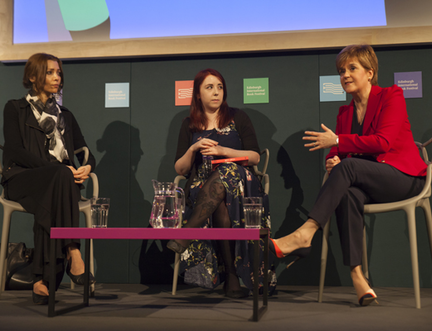
First Minister Nicola Sturgeon has admitted she finds the word nationalism “difficult”, and that if she “could turn the clock back” she would give the party she leads a different name.
The SNP leader was in discussion with Turkish writer Elif Shafak and Heather McDaid, founder of the Scottish publishing company 404 Ink and co-editor of Nasty Women, an anthology of essays about women in the 21st century. Shafak, who was wrongly accused of “public denigration of Turkishness” for her novel The Bastard of Istanbul, told Sturgeon she doubted that nationalism, even the Scottish variety, could “ever be a benevolent thing”.
“The word is difficult,” replied the First Minister. “If I could turn the clock back 90 years to the establishment of my party and choose its name all over again, I wouldn’t choose the name it’s got just now, I would call it something other than the Scottish National Party. [But] what those of us who support Scottish independence are all about could not be further removed from some of what you would recognise as nationalism in other parts of the world.”
Later, Shafak said: “Every nationalistic ideology teaches us tribalism, it tells us we all belong in tribes, it tells us that we will be safer, or better, more comfortable if we’re surrounded by same-ness, and there’s a part of me that does not like that. I think we benefit from diversity, from cosmopolitanism. I know it’s very challenging, but if we’re ever going to learn anything in this life it’s from people who are different from us, [who are] not exactly like us.”
The panel also discussed the positives and negatives of social media. On one level, said Sturgeon, it was “very empowering”, although she added that it was “fraught with lots and lots of challenges”. “It’s really difficult because people believe what they read online,” she added, “people are putting their faith in information; people read something on Facebook and they almost take for granted that it must be true.”
Heather McDaid then revealed that a “group of neo-Nazis in America” had found out about the Nasty Women anthology and started sending her and a colleague “graphic photographs of mutilated women”. “We’re literally two women in Scotland who have nothing to do with them apart from this tenuous connection to Trump,” she said. “There’s a lot of positives [to social media] but you have to have some resilience to keep doing it.”
Commenting on Donald Trump, Sturgeon said she did not question his legitimacy as the democratically-elected President of the United States, but believed “it matters to us in this country that we don’t see the rise of fascism in the United States of America frankly, so there are some things where I don’t think diplomatic silence is appropriate”. The First Minister also admitted to experiencing “a little bit of envy” as she watched President Trump shout “wheesht, fake news” at reporters earlier this week. “I have fantasies”, she joked, “about doing that at press conferences.”
And on the subject of feminism, Sturgeon said: “I still think for all the progress we’ve made for equal rights for women, we’ve still got such a long way to go. We now have a situation where, in theory, women in this country can do pretty much anything, but in practice that’s still not the case, because we’ve got ingrained attitudes and systemic institutional barriers to women achieving all the same things, and the same dreams, as men.” And she added that “other women can be our worst enemies”, in that “we are each other’s biggest critics…we need to find more ways of supporting each other rather than rushing to bring each other down.”
Asked about a recent sexism row involving Clarks’ children’s shoes, the First Minister said: “The fact that the girl’s shoe was called ‘Dolly Babe’ is not what really troubled me about it, but the fact the boy’s shoe was called ‘Leader’. Swap it around occasionally!
“I know these things are quite difficult and challenging, and I think for people like me you’ve got to watch that you don’t just become – or people don’t think you’re becoming – horribly politically correct. I’ve no interest in that, but you do sometimes have to challenge these things. You know, my niece is eleven years old…what I do mind is if anywhere in her brain she’s getting the message that only boys are leaders. Words matter.”
Look, Listen & Read
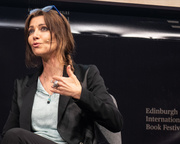
Turkish writer Elif Shafak: “Populism is a fake answer to real problems”
Fri 23 August 2019
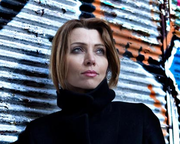

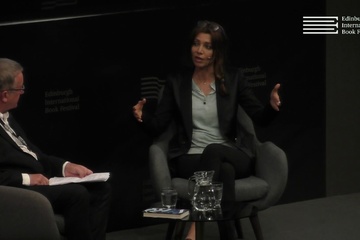
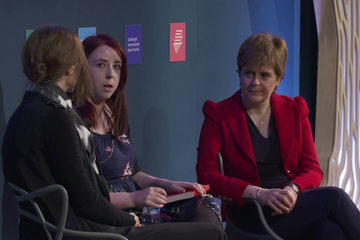
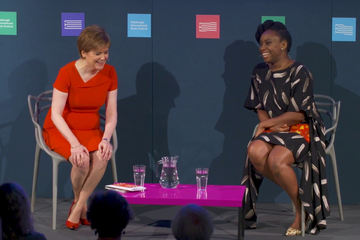
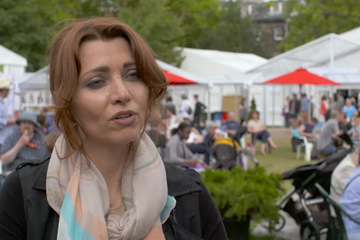
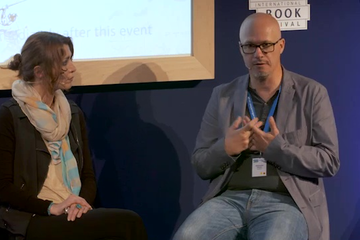
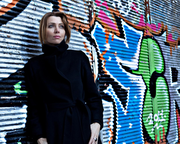
 Major new partnership with Celtic Connections
Major new partnership with Celtic Connections 

